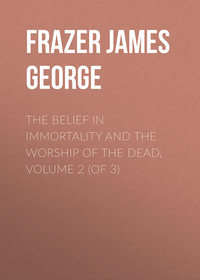 полная версия
полная версияThe Golden Bough: A Study in Comparative Religion (Vol. 1 of 2)
Wherever, as in Japan and West Africa, it is supposed that the order of nature, and even the existence of the world, is bound up with the life of the king or priest, it is clear that he must be regarded by his subjects as a source both of infinite blessing and of infinite danger. On the one hand, the people have to thank him for the rain and sunshine which foster the fruits of the earth, for the wind which brings ships to their coasts, and even for the existence of the earth beneath their feet. But what he gives he can refuse; and so close is the dependence of nature on his person, so delicate the balance of the system of forces whereof he is the centre, that the slightest irregularity on his part may set up a tremor which shall shake the earth to its foundations. And if nature may be disturbed by the slightest involuntary act of the king, it is easy to conceive the convulsion which his death might occasion. The death of the Chitomé, as we have seen, was thought to entail the destruction of the world. Clearly, therefore, out of a regard for their own safety, which might be imperilled by any rash act of the king, and still more by his death, the people will exact of their king or priest a strict conformity to those rules, the observance of which is necessary for his own preservation, and consequently for the preservation of his people and the world. The idea that early kingdoms are despotisms in which the people exist only for the sovereign, is wholly inapplicable to the monarchies we are considering. On the contrary, the sovereign in them exists only for his subjects; his life is only valuable so long as he discharges the duties of his position by ordering the course of nature for his people's benefit. So soon as he fails to do so the care, the devotion, the religious homage which they had hitherto lavished on him, cease and are changed into hatred and contempt; he is dismissed ignominiously, and may be thankful if he escapes with his life. Worshipped as a god by them one day, he is killed by them as a criminal the next. But in this changed behaviour of the people there is nothing capricious or inconsistent. On the contrary, their conduct is entirely of a piece. If their king is their god, he is or should be also their preserver; and if he will not preserve them, he must make room for another who will. So long, however, as he answers their expectations, there is no limit to the care which they take of him, and which they compel him to take of himself. A king of this sort lives hedged in by a ceremonious etiquette, a network of prohibitions and observances, of which the intention is not to contribute to his dignity, much less to his comfort, but to restrain him from conduct which, by disturbing the harmony of nature, might involve himself, his people, and the universe in one common catastrophe. Far from adding to his comfort, these observances, by trammelling his every act, annihilate his freedom and often render the very life, which it is their object to preserve, a burden and sorrow to him.
Of the supernaturally endowed kings of Loango it is said that the more powerful a king is, the more taboos is he bound to observe; they regulate all his actions, his walking and his standing, his eating and drinking, his sleeping and waking.381 To these restraints the heir to the throne is subject from infancy; but as he advances in life the number of abstinences and ceremonies which he must observe increases, “until at the moment that he ascends the throne he is lost in the ocean of rites and taboos.”382 The kings of Egypt, as we have seen,383 were worshipped as gods, and the routine of their daily life was regulated in every detail by precise and unvarying rules. “The life of the kings of Egypt,” says Diodorus,384 “was not like that of other monarchs who are irresponsible and may do just what they choose; on the contrary, everything was fixed for them by law, not only their official duties, but even the details of their daily life… The hours both of day and night were arranged at which the king had to do, not what he pleased, but what was prescribed for him… For not only were the times appointed at which he should transact public business or sit in judgment; but the very hours for his walking and bathing and sleeping with his wife, and, in short, performing every act of life, were all settled. Custom enjoined a simple diet; the only flesh he might eat was veal and goose, and he might only drink a prescribed quantity of wine.” Of the taboos imposed on priests, the rules of life observed by the Flamen Dialis at Rome furnish a striking example. As the worship of Virbius at Nemi was conducted, as we have seen,385 by a Flamen, who may possibly have been the King of the Wood himself, and whose mode of life may have resembled that of the Roman Flamen, these rules have a special interest for us. They were such as the following: The Flamen Dialis might not ride or even touch a horse, nor see an army under arms, nor wear a ring which was not broken, nor have a knot on any part of his garments; no fire except a sacred fire might be taken out of his house; he might not touch wheaten flour or leavened bread; he might not touch or even name a goat, a dog, raw meat, beans, and ivy; he might not walk under a vine; the feet of his bed had to be daubed with mud; his hair could be cut only by a free man and with a bronze knife, and his hair and nails when cut had to be buried under a lucky tree; he might not touch a dead body nor enter a place where one was burned; he might not see work being done on holy days; he might not be uncovered in the open air; if a man in bonds were taken into his house, he had to be unbound and the cords had to be drawn up through a hole in the roof and so let down into the street. His wife, the Flaminica, had to observe nearly the same rules, and others of her own besides. She might not ascend more than three steps of the kind of staircase called Greek; at a certain festival she might not comb her hair; the leather of her shoes might not be made from a beast that had died a natural death, but only from one that had been slain or sacrificed; if she heard thunder she was tabooed till she had offered an expiatory sacrifice.386
The burdensome observances attached to the royal or priestly office produced their natural effect. Either men refused to accept the office, which hence tended to fall into abeyance; or accepting it, they sank under its weight into spiritless creatures, cloistered recluses, from whose nerveless fingers the reigns of government slipped into the firmer grasp of men who were often content to wield the reality of sovereignty without its name. In some countries this rift in the supreme power deepened into a total and permanent separation of the spiritual and temporal powers, the old royal house retaining their purely religious functions, while the civil government passed into the hands of a younger and more vigorous race.
To take examples. We saw387 that in Cambodia it is often necessary to force the kingships of Fire and Water upon the reluctant successors, and that in Savage Island the monarchy actually came to an end because at last no one could be induced to accept the dangerous distinction.388 In some parts of West Africa, when the king dies, a family council is secretly held to determine his successor. He on whom the choice falls is suddenly seized, bound, and thrown into the fetish-house, where he is kept in durance till he consents to accept the crown. Sometimes the heir finds means of evading the honour which it is sought to thrust upon him; a ferocious chief has been known to go about constantly armed, resolute to resist by force any attempt to set him on the throne.389 The Mikados of Japan seem early to have resorted to the expedient of transferring the honours and burdens of supreme power to their infant children; and the rise of the Tycoons, long the temporal sovereigns of the country, is traced to the abdication of a certain Mikado in favour of his three-year-old son. The sovereignty having been wrested by a usurper from the infant prince, the cause of the Mikado was championed by Yoritomo, a man of spirit and conduct, who overthrew the usurper and restored to the Mikado the shadow, while he retained for himself the substance, of power. He bequeathed to his descendants the dignity he had won, and thus became the founder of the line of Tycoons. Down to the latter half of the sixteenth century the Tycoons were active and efficient rulers; but the same fate overtook them which had befallen the Mikados; entangled in the same inextricable web of custom and law, they degenerated into mere puppets, hardly stirring from their palaces and occupied in a perpetual round of empty ceremonies, while the real business of government was managed by the council of state.390 In Tonquin the monarchy ran a similar course. Living like his predecessors in effeminacy and sloth, the king was driven from the throne by an ambitious adventurer named Mack, who from a fisherman had risen to be Grand Mandarin. But the king's brother Tring put down the usurper and restored the king, retaining, however, for himself and his descendants the dignity of general of all the forces. Thenceforward the kings or dovas, though vested with the title and pomp of sovereignty, ceased to govern. While they lived secluded in their palaces, all real political power was wielded by the hereditary generals or chovas.391 The custom regularly observed by the Tahitian kings of abdicating on the birth of a son, who was immediately proclaimed sovereign and received his father's homage, may perhaps have originated, like the similar custom occasionally practised by the Mikados, in a wish to shift to other shoulders the irksome burden of royalty; for in Tahiti as elsewhere the sovereign was subjected to a system of vexatious restrictions.392 In Mangaia, another Polynesian island, religious and civil authority were lodged in separate hands, spiritual functions being discharged by a line of hereditary kings, while the temporal government was entrusted from time to time to a victorious war-chief, whose investiture, however, had to be completed by the king. To the latter were assigned the best lands, and he received daily offerings of the choicest food.393 American examples of the partition of authority between an emperor and a pope have already been cited from the early history of Mexico and Colombia.394
§ 2. – The nature of the soul
But if the object of the taboos observed by a divine king or priest is to preserve his life, the question arises, How is their observance supposed to effect this end? To understand this we must know the nature of the danger which threatens the king's life, and which it is the intention of the taboos to guard against. We must, therefore, ask: What does early man understand by death? To what causes does he attribute it? And how does he think it may be guarded against?
As the savage commonly explains the processes of inanimate nature by supposing that they are produced by living beings working in or behind the phenomena, so he explains the phenomena of life itself. If an animal lives and moves, it can only be, he thinks, because there is a little animal inside which moves it. If a man lives and moves, it can only be because he has a little man inside who moves him. The animal inside the animal, the man inside the man, is the soul. And as the activity of an animal or man is explained by the presence of the soul, so the repose of sleep or death is explained by its absence; sleep or trance being the temporary, death being the permanent absence of the soul. Hence if death be the permanent absence of the soul, the way to guard against it is either to prevent the soul from leaving the body, or, if it does depart, to secure that it shall return. The precautions adopted by savages to secure one or other of these ends take the form of prohibitions or taboos, which are nothing but rules intended to ensure either the continued presence or the return of the soul. In short, they are life-preservers or life-guards. These general statements will now be illustrated by examples.
Addressing some Australian blacks, a European missionary said, “I am not one, as you think, but two.” Upon this they laughed. “You may laugh as much as you like,” continued the missionary, “I tell you that I am two in one; this great body that you see is one; within that there is another little one which is not visible. The great body dies, and is buried, but the little body flies away when the great one dies.” To this some of the blacks replied, “Yes, yes. We also are two, we also have a little body within the breast.” On being asked where the little body went after death, some said it went behind the bush, others said it went into the sea, and some said they did not know.395 The Hurons thought that the soul had a head and body, arms and legs; in short, that it was a complete little model of the man himself.396 The Eskimos believe that “the soul exhibits the same shape as the body it belongs to, but is of a more subtle and ethereal nature.”397 So exact is the resemblance of the mannikin to the man, in other words, of the soul to the body, that, as there are fat bodies and thin bodies, so there are fat souls and thin souls;398 as there are heavy bodies and light bodies, long bodies and short bodies, so there are heavy souls and light souls, long souls and short souls. The people of Nias (an island to the west of Sumatra) think that every man, before he is born, is asked how long or how heavy a soul he would like, and a soul of the desired weight or length is measured out to him. The heaviest soul ever given out weighs about ten grammes. The length of a man's life is proportioned to the length of his soul; children who die young had short souls.399 Sometimes, however, as we shall see, the human soul is conceived not in human but in animal form.
The soul is commonly supposed to escape by the natural openings of the body, especially the mouth and nostrils. Hence in Celebes they sometimes fasten fish-hooks to a sick man's nose, navel, and feet, so that if his soul should try to escape it may be hooked and held fast.400 One of the “properties” of a Haida medicine-man is a hollow bone, in which he bottles up departing souls, and so restores them to their owners.401 The Marquesans used to hold the mouth and nose of a dying man, in order to keep him in life, by preventing his soul from escaping.402 When any one yawns in their presence the Hindus always snap their thumbs, believing that this will hinder the soul from issuing through the open mouth.403 The Itonamas in South America seal up the eyes, nose, and mouth of a dying person, in case his ghost should get out and carry off other people.404 In Southern Celebes, to prevent the escape of a woman's soul at childbirth, the nurse ties a band as tightly as possible round the body of the expectant mother.405 And lest the soul of the babe should escape and be lost as soon as it is born, the Alfoers of Celebes, when a birth is about to take place, are careful to close every opening in the house, even the keyhole; and they stop up every chink and cranny in the walls. Also they tie up the mouths of all animals inside and outside the house, for fear one of them might swallow the child's soul. For a similar reason all persons present in the house, even the mother herself, are obliged to keep their mouths shut the whole time the birth is taking place. When the question was put, Why they did not hold their noses also, lest the child's soul should get into one of them? the answer was that breath being exhaled as well as inhaled through the nostrils, the soul would be expelled before it could have time to settle down.406
Often the soul is conceived as a bird ready to take flight. This conception has probably left traces in most languages,407 and it lingers as a metaphor in poetry. But what is metaphor to a modern European poet was sober earnest to his savage ancestor, and is still so to many people. The Malays carry out the conception in question to its practical conclusion. If the soul is a bird on the wing, it may be attracted by rice, and so prevented from taking its perilous flight. Thus in Java when a child is placed on the ground for the first time (a moment which uncultured people seem to regard as especially dangerous), it is put in a hen-coop and the mother makes a clucking sound, as if she were calling hens.408 Amongst the Battas of Sumatra, when a man returns from a dangerous enterprise, grains of rice are placed on his head, and these grains are called padiruma tondi, that is, “means to make the soul (tondi) stay at home.” In Java also rice is placed on the head of persons who have escaped a great danger or have returned home unexpectedly after it had been supposed that they were lost.409 In Celebes they think that a bridegroom's soul is apt to fly away at marriage, so coloured rice is scattered over him to induce it to stay. And, in general, at festivals in South Celebes rice is strewed on the head of the person in whose honour the festival is held, with the object of detaining his soul, which at such times is in especial danger of being lured away by envious demons.410
The soul of a sleeper is supposed to wander away from his body and actually to visit the very places of which he dreams. But this absence of the soul has its dangers, for if from any cause it should be permanently detained away from the body, the person, deprived of his soul, must die.411 Many causes may detain the sleeper's soul. Thus, his soul may meet the soul of another sleeper and the two souls may fight; if a Guinea negro wakens with sore bones in the morning, he thinks that his soul has been thrashed by another soul in sleep.412 Or it may meet the soul of a person just deceased and be carried off by it; hence in the Aru Islands the inmates of a house will not sleep the night after a death has taken place in it, because the soul of the deceased is supposed to be still in the house and they fear to meet it in a dream.413 Again, the soul may be prevented by physical force from returning. The Santals tell how a man fell asleep, and growing very thirsty, his soul, in the form of a lizard, left his body and entered a pitcher of water to drink. Just then the owner of the pitcher happened to cover it; so the soul could not return to the body and the man died. While his friends were preparing to burn the body some one uncovered the pitcher to get water. The lizard thus escaped and returned to the body, which immediately revived; so the man rose up and asked his friends why they were weeping. They told him they thought he was dead and were about to burn his body. He said he had been down a well to get water but had found it hard to get out and had just returned. So they saw it all.414 A similar story is reported from Transylvania as follows. In the account of a witch's trial at Mühlbach last century it is said that a woman had engaged two men to work in her vineyard. After noon they all lay down to rest as usual. An hour later the men got up and tried to waken the woman, but could not. She lay motionless with her mouth wide open. They came back at sunset and still she lay like a corpse. Just at that moment a big fly came buzzing past, which one of the men caught and shut up in his leathern pouch. Then they tried again to waken the woman but could not. Afterwards they let out the fly; it flew straight into the woman's mouth and she awoke. On seeing this the men had no further doubt that she was a witch.415
It is a common rule with primitive people not to waken a sleeper, because his soul is away and might not have time to get back; so if the man wakened without his soul, he would fall sick. If it is absolutely necessary to waken a sleeper, it must be done very gradually, to allow the soul time to return.416 In Bombay it is thought equivalent to murder to change the appearance of a sleeper, as by painting his face in fantastic colours or giving moustaches to a sleeping woman. For when the soul returns, it will not be able to recognise its body and the person will die.417 The Servians believe that the soul of a sleeping witch often leaves her body in the form of a butterfly. If during its absence her body be turned round, so that her feet are placed where her head was before, the butterfly soul will not find its way back into her body through the mouth, and the witch will die.418
But in order that a man's soul should quit his body, it is not necessary that he should be asleep. It may quit him in his waking hours, and then sickness or (if the absence is prolonged) death will be the result. Thus the Mongols sometimes explain sickness by supposing that the patient's soul is absent, and either does not care to return to its body or cannot find the way back. To secure the return of the soul it is therefore necessary on the one hand to make its body as attractive as possible, and on the other hand to show it the way home. To make the body attractive all the sick man's best clothes and most valued possessions are placed beside him; he is washed, incensed, and made as comfortable as possible; and all his friends march thrice round the hut calling out the sick man's name and coaxing his soul to return. To help the soul to find its way back a coloured cord is stretched from the patient's head to the door of the hut. The priest in his robes reads a list of the horrors of hell and the dangers incurred by souls which wilfully absent themselves from their bodies. Then turning to the assembled friends and the patient he asks, “Is it come?” All answer Yes, and bowing to the returning soul throw seed over the sick man. The cord which guided the soul back is then rolled up and placed round the patient's neck, who must wear it for seven days without taking it off. No one may frighten or hurt him, lest his soul, not yet familiar with its body, should again take flight.419 In an Indian story a king conveys his soul into the dead body of a Brahman, and a hunchback conveys his soul into the deserted body of the king. The hunchback is now king and the king is a Brahman. However, the hunchback is induced to show his skill by transferring his soul to the dead body of a parrot, and the king seizes the opportunity to regain possession of his own body.420 In another Indian story a Brahman reanimates the dead body of a king by conveying his own soul into it. Meantime the Brahman's body has been burnt, and his soul is obliged to remain in the body of the king.421
The departure of the soul is not always voluntary. It may be extracted from the body against its will by ghosts, demons, or sorcerers. Hence, when a funeral is passing the house, the Karens of Burma tie their children with a special kind of string to a particular part of the house, in case the souls of the children should leave their bodies and go into the corpse which is passing. The children are kept tied in this way until the corpse is out of sight.422 And after the corpse has been laid in the grave, but before the earth has been filled in, the mourners and friends range themselves round the grave, each with a bamboo split lengthwise in one hand and a little stick in the other; each man thrusts his bamboo into the grave, and drawing the stick along the groove of the bamboo points out to his soul that in this way it may easily climb up out of the grave. While the earth is being filled in, the bamboos are kept out of the way, lest the souls should be in them, and so should be inadvertently buried with the earth as it is being thrown into the grave; and when the people leave the spot they carry away the bamboos, begging their souls to come with them.423 Further, on returning from the grave each Karen provides himself with three little hooks made of branches of trees, and calling his spirit to follow him, at short intervals, as he returns, he makes a motion as if hooking it, and then thrusts the hook into the ground. This is done to prevent the soul of the living from staying behind with the soul of the dead.424 When a mother dies leaving a young baby, the Burmese think that the “butterfly” or soul of the baby follows that of the mother, and that if it is not recovered the child must die. So a wise woman is called in to get back the baby's soul. She places a mirror near the corpse, and on the mirror a piece of feathery cotton down. Holding a cloth in her open hands at the foot of the mirror, she with wild words entreats the mother not to take with her the “butterfly” or soul of her child, but to send it back. As the gossamer down slips from the face of the mirror she catches it in the cloth and tenderly places it on the baby's breast. The same ceremony is sometimes observed when one of two children that have played together dies, and is thought to be luring away the soul of its playmate to the spirit-land. It is sometimes performed also for a bereaved husband or wife.425 In the Island of Keisar (East Indies) it is thought imprudent to go near a grave at night, lest the ghosts should catch and keep the soul of the passer-by.426 The Key Islanders believe that the souls of their forefathers, angry at not receiving food, make people sick by detaining their souls. So they lay offerings of food on the grave and beg their ancestors to allow the soul of the sick to return or to drive it home speedily if it should be lingering by the way.427








